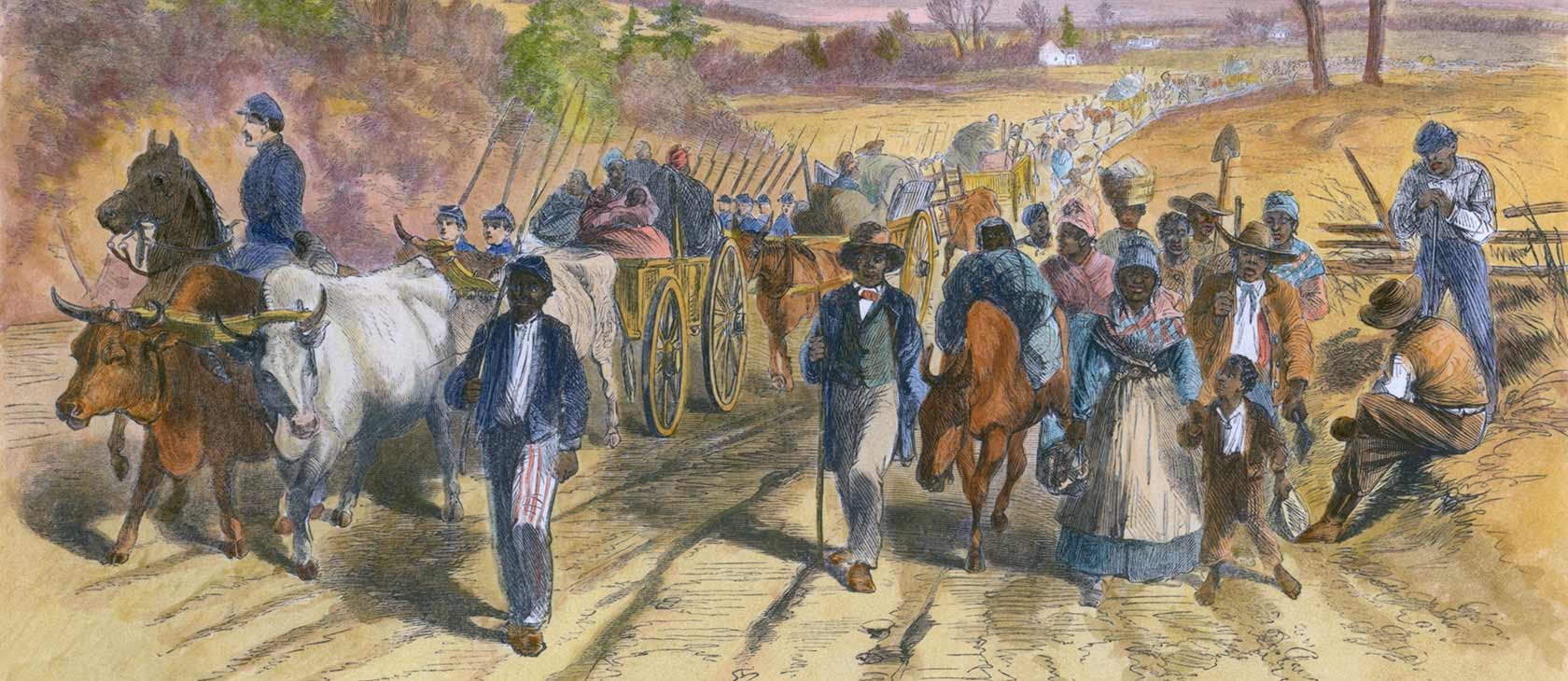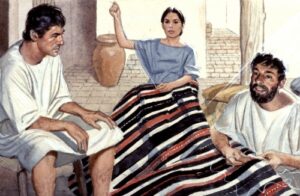
Better than an angel…a Saviour!
The weary world rejoices! Does it? How are you doing, Evergreen? How are you doing? Weary and rejoicing don’t even belong in the same sentence, do they? Does this weary world rejoice? Are you weary? Does it feel like weariness has been sitting on your chest for months? Is your rejoice switch in the on position, or the off position?
Pastor Scotty Smith posted on facebook this week, “Christmas brings no pressure to be “up.” The “hope and fears of all the years” meet in Jesus; and “a weary world rejoices” at his coming. Hope doesn’t replace fear, it invades it. Rejoicing doesn’t replace weariness, it inhabits it.”
Do you need a Savior? Of course, we have one. We have one. But this morning, do you need a Savior? Are you weary in waiting for something in your life that seems impossible?
Let’s look to the text: Luke 1. Read Luke 1:1-25
He leaves the house again and again and again. And again. Day after day. Some mornings he can hardly bear to tell her good bye. This is their normal. It’s been this way for a long time. It’s not of their choosing. And he can’t change it. When he goes to work, well, it’s important. He does his work, “unto the Lord.” With all his heart. But in a tiny piece of his mind, he carries thoughts of her. She is his forever bride. He wants everything for her. He wants joy in her heart and life. But what can he do? He pushes questions aside. He gives thought to his faith…his strong faith…to trusting God. It is the only solution he has for understanding. For coping. For sanity. He leans into his faith and lives it. One more day. One more day.
The house is empty. He is gone for the day. She thinks about herself, her life. She thinks about her husband. She feels she has let him down. It is her fault. She cannot fix it. She knows he wants to fix it. So many thoughts swirl around her head. She loves the Lord, and is faithful to seek His ways. But the ache in her heart feels physical some days. It has weight to it. She feels in her whole body. Somedays she can hardly lift her arms to do the tasks of her day. Sometimes…sometimes she can barely lift her head. She says prayers as she walks and works. Her worship sincere, yet her mind full of questions. She has so many questions. When they were first married…she was younger…they were younger…they had so much joy. It was never easy. It is hard work, two becoming one. It is hard work knowing how to reach your hand out and find his. It was hard work, what they did together to build a life. But it was also wonderful. She remembers it, as if it were a place. A place to try to find each day. On top of the pain she already has, she feels guilt…shame…in her thinking that what she has is not enough. It is a burden she cannot get free of. A wrong that is never righted. A weight she cannot set aside.
They don’t talk about it. Oh, no! He will come home and they will eat. They will talk of other things. They look into each other’s wrinkled faces. She laughs, and he loves the wrinkles that come to life around her eyes. She laughs…for him. He laughs…for her. So deep is their love. He will lie down next to her at night. Probably hold her awhile as they fall asleep. Their tiredness becomes peaceful rest that turns to sleep. It is good. Yes, our Lord is good. And we will take what He has given us.
But He, the Lord, has not given us children. None. None. Not one. Not any.
It is an agonizing none. This none…it is a prison. Because…Elizabeth…was…barren. They have no children. Verse 7: “But they had no children because Elizabeth was barren.
So says the scripture in Luke 1, where we will spend our time this morning.
Evergreen, Do you need a Savior? This morning, do you need a Savior?
Are you wrestling with a barrenness of the heart?
Do you have a deep sadness of the heart?
Do you find yourself in an agonizing “none”…a prison?
None. Not for me. Nothing for me.
Do you need to be reminded of something?
Do you need your heart to be stirred?
Ahhhhhh. Do we need our hearts to be stirred?
Do we need the impossible? Do we need a Savior?
Christmas. Advent. Waiting for something good to happen. Waiting for the very best good to happen. Waiting for “it’s the most wonderful time…of the year” to happen. Waiting for the impossible to happen.
Oh, it’s already happened. But we wait for it to happen…again…to us…for us. We want our hearts to be stirred.
Wouldn’t it be nice to have an angel appear? Have an angel say your name. The angel Gabriel appears in Luke 1, first to Zechariah and then to Mary (the mother of Jesus) in Luke 1: 26-38, and both times he says “Do not be afraid. And then Gabriel says their name. “Zechariah.” “Mary.” There is something about having your name spoken aloud. Attention getting. Personal. Intimate. “Zechariah.” “Mary.”
Wouldn’t it be nice to have an angel appear? Yes, please. That is what I would like. I’d like an angel. To startle me. Scare me even. Fill me with fear. Fill me with wonder. Fill me with joy. Say my name. Yes, please. Say my name. Stir my heart. See my barrenness. See my barrenness. See my emptiness. See my hurt. See my prison. Say my name. Please. Please. I’d like an angel. I need an angel. I…really need an angel.
The joy of Christmas. Do you wonder at Christmas, what will stir your heart? What new thing will thrill me about this Christmas? How will I move past a weariness of the season or a weariness of my heart…things I must do…places I must go…people I must spend time with where it might be awkward. The ache of people I have lost this year. All the baggage of the past year. What new things will thrill me? How will the Christmas story move me again to rejoice in my Jesus and my faith? What about my barrenness? My bleakness? My lifelessness? My emptiness? My tiredness? This is where we might find ourselves 12 days before Christmas on December 13th. One week before Christmas. Three days before Christmas. Every year before Christmas. Waiting for our hearts to be stirred. Tell me a story. No, not that story. We hold up a hand. We cross our arms. We shake our head. Not that story. We know that story. It doesn’t stir our hearts so much anymore. Tell us a new story. And maybe we think, “tell us a story…and please…could there be an angel?”
Elizabeth was barren. Her womb. Her heart. She loved the Lord her God, but also carried a sadness of the heart. A barrenness of the heart. Do you feel the same?
Maybe…maybe send me an angel?
It might be easy to say “Shame on us, if that is true.” But you know what? It was true for Zechariah. It was true for Elizabeth. In their hearts, their lives, they were so so hungry for a new story. Weren’t they? A new story. Stir our hearts. Stir my womb. Maybe it had been awhile since they prayed that way. Maybe they prayed that way at first. Maybe for years. But now, “they were along in years.” Much older. In their time, they were the modern day Abraham and Sarah. They were. Do you think they knew that story? Surely they did. And do you think Zechariah and Elizabeth thought about Abraham and Sarah, and then thought, “Why not us, too?” I would. I would everyday…for the first year. And most everyday…for the next couple years. And once a week for the year after that. Until, after time, I told myself, “I will take what He has given me.” I would try to let gratefulness grow in my heart…pray for it, feed it, nourish it…and push regret and anger and doubt into a tiny corner of my heart.
And so “tell us a new story.” Our hearts desire “tell us a new story”…becomes, maybe, with a shoulder shrug…this is our story and there is nothing we can do about it. This is what God has chosen for us. Zachariah and Elizabeth. Faithful in their walk, thanking God for His goodness, and to be fair…ordinary folks like you and me doing the best they can in life. They don’t ask God for much. They work at trusting Him and loving Him.
Until. Until. Until. It is not the greatest “until” ever. But it is a pretty good “until.” An ordinary day for Zechariah and Elizabeth…until it is not. One ordinary day Zechariah is chosen by lot according to the priesthood to go into the temple of the Lord and burn incense, and the angel Gabriel appears. “Do not be afraid, Zechariah; your prayer has been heard. Your wife Elizabeth will bear you a son, and you are to give him the name John. He will be a joy and delight to you, and many will rejoice because of his birth…”
My prayer has been heard? Which prayer? The one from 15 minutes ago? The one from this morning? The same prayer I’ve prayed 500 times…5,000 times? The same prayer I’ve prayed for 50 years? The prayer that I’ve carved into my heart, I’ve prayed it so many times. What words Zechariah is hearing from the angel! Your prayer. Wait. What? My prayer has been answered?
Of course, when the angel finishes talking…this is an angel, right? A glorious heavenly being with a word from God. And as the angel pauses, Zechariah does not fall to his knees or on his face in praise or thanksgiving. There is no rejoicing in the weariness he has carried for years. Instead, he says, “How can I be sure of this? I am an old man and my wife is well along in years.”
He knows the story of Abraham and Sarah and Isaac, and he has an angel right in front of him. Yet Zechariah has doubt. Unbelief. That is what you and I would do with an angel appearing. Our response. Doubt. Unbelief. Even an angel of the Lord isn’t good enough to stir our hearts and give us faith. “Your prayer has been answered.” How can I be sure? My prayer has gone unanswered for so long.
Do you think if the angel Gabriel had literally flew down and put a baby in Zechariah’s and Elizabeth’s arms, and said, “God has given this baby to you. He is yours. Call him John.”…do you think they would have believed? “How can this baby be ours? Where did he come from? What are we supposed to tell our neighbors? This is unbelievable.” Well, an angel appearing with any message…this message that Elizabeth will have a child…is pretty unbelievable. Yes?
So then. The angel says to Zechariah in Luke 1:20, now because you didn’t believe my words, you will not be able to speak.
And I want to ask you. What words of God do you not believe? What words of scripture are cold to you? Really. What words of scripture are cold to you?
I love words. My vocabulary is small, but I love words. God is the God of words. Of covenants. Promises. Of keeping His Word. I am who I am. Of sending us the Living Word. Of giving us His written Word.
What words do we not believe? Would any of us possibly say, “Oh, I know His words are true, but I don’t believe them.” Maybe we would just say, “They’re true, but I don’t have the faith to live them anymore.” What if God shut our mouths when we doubted? What if….
But when we are in weariness, in doubt…when scripture might seem cold…God is near. Present. Caring. Ready to listen. Always aware. Ready to work. Many times in my bookstore as I showed a bible to a customer, I have said “This is the Word of God, powerful and true, all-sufficient for our salvation.” And I tell you today, that cold scripture is warm scripture waiting to happen. Waiting to come alive in your hearts. As Scotty Smith suggested, the truth, our reason to rejoice, is “ready to inhabit our weariness.”
And so Elizabeth becomes pregnant and gives birth to John. John the Baptist. Their prayer has been answered. Their considerable prayer born out of great barrenness of heart, gave birth to the impossible, because God moves that way, to bring Himself glory and work for our good. Our impossible is His ordinary. What should we not ask Him for? Does Romans 8 not say, “He who gave us His Son, will he not also freely give us all things?”
And now, later in Luke, even young Mary, our sweet young Mary…she questions the angel Gabriel. “How will this be, since I am a virgin?” (Whisper: this is unbelievable!). Is she saying, “Explain it to me?” Or is she saying “How can I believe this?…This is unbelievable!”
I can’t say, which one she meant. Maybe some of both. And in this case, this was not the answer to one considerable prayer. Not one by Mary. It was the fulfillment of a considerable promise. It was God’s answer of love to the collective groans and moans of generation after generation waiting for the Servant of the Lord (Isaiah 42:1-4) to come.
I would have liked to have been there. And heard Mary’s young, young woman’s voice. The scripture says in Luke 1:29, “Mary was greatly troubled at his words, the angel, and wondered what kind of greeting this might be (highly favored). And now she hears she will be with child, the Son of God…Do you think her voice was much more than a whisper? “How will this be?”
Doubt. Unbelief. The place where weariness takes root. The obstacle to our heart’s being stirred. The obstacle to moving past the barrenness of our hearts, our hurts, the weariness in our faith. The obstacle to receiving what God has for us. “How will this be?” “How can this be?” “Will this ever be?” The obstacle to hearing the greatest story ever told. The obstacle to receiving the greatest story ever told. We want a new story, but we wouldn’t believe it if we heard it. Do you want a new story? We have a new story! Do you want the impossible? We have the impossible! Do you want to hear your name called? God calls us each by name.
You want your heart stirred? Are you ready? Are you ready? Buckle up, because here it is. God had a plan to make you His from the beginning of time. And God has a plan to stir hearts. Oh, does He. To stir Zechariah and Elizabeth’s hearts. To stir Mary’s heart. Joseph’s heart. To stir the hearts of all His beloved. To stir your heart. Do you hear me? God has a plan to stir your heart. But his plan is bigger! Bigger than stirring hearts. His plan is redeeming hearts. His plan is doing the impossible. That’s what He says. “I’ll do the impossible.”
Earlier I said “until”. And I said it was not the greatest “until” ever, but it was a pretty big until. THIS. THIS right here, now. This is the greatest until ever.
Sin and judgement and death until…
Shame and guilt and punishment until…
Every heart waiting and waiting until…
Until, “Do not be afraid, Mary, you have found favor with God. You will be with child and give birth to a son, and you are to give him the name Jesus. He will be great and be called the Son of the Most High. The Lord God will give him the throne of his father David, and he will reign over the house of Jacob forever; his kingdom will never end.”
Eternal hopelessness….until….THIS! And while in the newer NIV, Luke 1:37 reads “For no word from God will ever fail.” Which is true and marvelous…in the older NIV which I carry that verse reads, “For nothing is impossible with God!” That sentence, that whole sentence, is the exclamation point of God sending His Son to die for our sins and make us His. It is the exclamation point that Paul repeats at the end of Romans 8, when he says “Nothing…nothing…will be able to separate us from the love of God, that is in Christ Jesus our Lord.”
You want your heart stirred? God says, I’ll do the impossible. You want your heart stirred? Forget about angels. Here is My Son. I’m sending you the one who will make you whole. Whose power and glory and grace and healing is far bigger than any barrenness or any weariness. I bring you life. I bring you eternal life. I bring you my Son, myself, my love, my certain promises.
I say your name. I say your name. I say your name.
I know your name, and I say it.
And I say it, because I know everything about you, and I care and I’m here.
God did the impossible. Gabriel speaks to Zachariah. God is doing the impossible. And six months later Gabriel says to Mary, God is doing the impossible. The great impossible. The greatest impossible. For nothing is impossible with God. Luke 1:37
I’m a virgin
I’m barren
I’m old
I’m young
I can’t talk
I’m weak
I’m afraid
I’m anxious
I do not have the favor of God
I have secret sin
I am disgraced
My marriage is in trouble
My finances are a mess
I’m troubled by broken relationships.
I’ve lost so much
My wounds will not heal
My heart is broken over pain that won’t go away
I have doubts. Big doubts.
My heart has not been stirred in a long time.
Yes. Yes to recognizing the true pain and hardship in your life. And then God did the impossible. Christ came. God showed up. God kept his Word. God showed his power. God loved you perfectly. God made you His. His Spirit makes His home in you, your Helper, your Comforter, your Strength, your Peace.
So let me ask you something. I find the story of Zechariah and Elizabeth to be immensely interesting. In the way it proceeded the birth of Jesus. In the way it shares Luke 1 with the birth of Jesus. Did we really need a John the Baptist? Did Jesus really need John the Baptist? Did He need a “guy”…like an opening act at a concert…a run ahead guy…a prepare the way guy? He’s Jesus. He’s the only begotten son of God. Now I don’t know the ways of God. But John’s life points us all to the role of sharing our stirred hearts with others. John’s life points us all to the role of sharing our stirred hearts with others. To announce the gospel. Proclaim the gospel. To point to Christ. To say, “Hey! You! Come here. Look! Listen! Do you want your heart stirred? Do you want to know about a God who does the impossible? Do you want to meet a God who will love you perfectly? Here’s Jesus. Look! He’s right here! I’m not worthy to bend down and untie his dirty sandals. But He is the Lamb of God who takes away my sin, and your sin, and sin of the whole world!”
And I almost missed this, from Luke 1:17. “And he (John the Baptist) will go on before the Lord, in the spirit and power of Elijah, to turn the hearts of the fathers to their children and the disobedient to the wisdom of the righteous—to make ready a people prepared for the Lord.”
Turn the hearts. John the Baptist will turn the hearts. Stir the hearts. Shake up the hearts. Do a work in the hearts. In the spirit and power of Elijah. The spirit of God. Oh, he will stir hearts and make them ready for Jesus!
I think, and I think this especially at Christmas, there is a John the Baptist in each of us. I tell you that our God says “NO” to that which separates you from Him, “NO” to that which steals your joy. And He says “I have done the GREAT Impossible, nothing greater than this, my Son, the Word made flesh. I will crush that which hurts you and makes you weak, and I will pour My Spirit into you so that it is overflowing. Let the Spirit move aside chairs and tables. Move aside clutter. Let the Spirit scatter wickedness and despair. Let Him move aside that which is dark and life-stealing in your life. My Spirit will come gently but fiercely and make space to abide and work wonderfully. Give Him space to do a great thing. My Spirit will be poured to overflowing in you, so much joy that you will be like John the Baptist, your heart stirred, and pointing and saying to others, “See my Jesus! He is wonderful. He knows your name, too!”
In a weary world…in our weary lives…there can be joy…rejoicing…beyond what our hearts can contain. There is a “John the Baptist” joy…the joy of pointing others to Jesus. The joy of being Jesus to others.
Can you imagine the sheer joy of announcing Jesus?
The joy of our own stirred heart, now stirring other hearts!
Oh, Lord, give us the joy of John the Baptist!
Let our joy be uncontainable!
Prepare the way for Christmas.
Prepare the way for others to find Christ.
Do you want your heart to be stirred?
Do you know Christ? Do you?
Let your heart be stirred!
Has He saved you from your sins?
Let your heart be stirred.
Do you know Him personally?
Let your heart be stirred.
Do you know the truth of Christmas, that He came, as a child, Word made flesh?
Let your heart be stirred.
Let it be more than stirred.
Receive the good news, and Let your heart overflow.
Those who are living in darkness and in the shadow of death.
Let their hearts be stirred.
Let their hearts be saved.
Let their hearts rejoice.
Here, today, is the Word of the Lord.
Do you believe it?
Let your heart be stirred!
Does He keep His promises?
Let your heart be stirred!
Did He send His Son for you?
Let your heart be stirred!
Did He conquer sin and death?
Let your heart be stirred!
You may not get an angel. You don’t need an angel. He sent His Son. Instead of an angel, you get a Savior. Look to the low places. Like a manger. Look to the high places. Like a cross. Look to the everyday places, and see He is there, ready to be with you. He’s not just passing by, as I told you last year when we looked at the blind man in John chapter 6. Jesus is not just passing by. He has stopped for you. He has stopped for you.
I don’t know what God will do for you. I don’t know what the next good thing from God will be. But I know it will be good. Like the waves of the ocean that continue to reach the shore, one after the other, I know the next good thing from God is coming. Maybe it’s come, and you don’t realize it. Maybe it’s in your hardship, where God is expressing His love and faithfulness to hold you steadfast in the most difficult circumstances. Maybe He sent an angel, or an answer, but you didn’t see it. Maybe you explained away your angel, your miracle. Maybe He comes in a whisper. Maybe He comes in the truth of His Word. Yes. Always yes to that. And He most definitely has come in Jesus…a Savior…our Savior! So here is what I say: Look past doubt to find faith. Look past prisons to see rescue. Look past barrenness and weariness to see wholeness and healing. See the One who loves you. He will help you in any barrenness. He may end your barrenness, or He will be with you through it. He will abide. He will carry you over every rough place. He will cover you with His wings. He will put you in the cleft of the rock where no enemy can touch you. He has already done THEE impossible for you. You know the phrase “Move heaven and earth”…suggesting what is done to accomplish an enormous task? God, doing the impossible, moved heaven to earth. And it was not impossible. Not even close.
Evergreen, do you need a Savior? Do you need your heart stirred? Do you need the impossible. Do you want what Mary had, where she says in Luke 1:46 “my soul glorifies the Lord and my spirit rejoices in God my Savior!” Do you want and believe what Zachariah has? “Praise be to the God of Israel, because he has come and redeemed his people.”
He has redeemed His people, and we, you and me, are his forever bride. Let your heart be stirred. He knows your name.
——-








 In our passage, we have a beautiful example of this. We have a great man, Apollos, and we have the people who contributed to his life, a husband and wife team, Priscilla and Aquila. They provide a pattern and example of one way we can join what God is doing in bringing redemption and restoration to a fallen world.
In our passage, we have a beautiful example of this. We have a great man, Apollos, and we have the people who contributed to his life, a husband and wife team, Priscilla and Aquila. They provide a pattern and example of one way we can join what God is doing in bringing redemption and restoration to a fallen world.